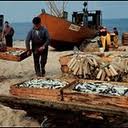Disnefranchising Africa on its own Shores
After bombing Libya to rubble, allowing rebel forces to capture and murder its dictator and meddling in the democratic processes that were the aftermath of the Arab Spring, the EU has upped the ante on its intervention in the African continent to a whole new level. It has now been revealed that the Libyan conflict was in fact exploited by Europe for economic enrichment from the fisheries industry which has racked up a stench in European and African newsrooms.
It all started in February 2010 when the European Court established that the fisheries agreement concluded between Morocco and the EU worth €36 million a year was illegal. This was announced with reference to the fact that a fishing project was to be executed in the waters of Western Sahara, a disputed territory which has been occupied by Morocco for more than 30 years and has had her right to self-determination ignored and repressed by Morocco and the West. In this instance, the EU sought to take advantage of Morocco’s authority as the occupying force therein and negotiated a fishing contract with them pertaining to the fishing of squid, octopus and sardines which would have proved lucrative for both Morocco and the EU. The court established that such a contract was indeed a violation of the human rights of the Saharawi people as they were the party a privy to such a contract and not Morocco in lieu of Morocco’s illegal occupation.
Towards the end of 2010 a scandal broke-out when it was uncovered that irregular fishing licences were awarded to European vessels to fish in Senegalese waters. This was despite the fact that Senegal had outlawed fishing by the EU in its own waters out of fear that they would over-fish the waters and leave very little produce for Senegal’s own local market. With seafood being a staple food in most African countries and given the fact that African waters have a 40% better catch than their European counterparts, one cannot blame the Senegalese for clamping down on excessive fishing in their waters.
This debacle was neatly followed by the expose on EU fishing subsidies. Greenpeace and the International Consortium of Investigative Journalists published results of an enquiry on illegal fishing in October of this year. They alleged that Spanish owned ships were heavily involved illegal fishing off Africa’s shores and that these very same fishing vessels had enjoyed EU subsidies from 2002 amounting to a whopping €15 million.
In a bid to clean her department of the stigma attached to these allegations, Madam Damanaki entered into a fisheries agreement with the US to improve cooperative relations between both countries toward countering fish piracy and IUU fishing (illegal, unreported, unregulated fishing). This noble declaration did very little however as we now learn of EU vessels illegally fishing off the Gulf of Sirte in Libyan waters despite the conflict which destroys the nation. A fisherman who has witnessed such activities has been anonymously working with WWF Greenpeace in exposing these crimes. It has been discovered that Italian vessels have been fishing in Libyan waters for blue-fin tuna, a rare commodity in the seafood market. As Italy has nearly banned blue-fin tuna in its own waters given the scarcity of the fish, the vessels moved toward the African continent and elected to continue their fishing expeditions against the backdrop of the country’s internal conflict. This occurred despite Madam Damanaki’s agreement in February of this year that all fishing in Libya’s waters shall cease given the country’s internal problems.
The exact facts of the matter shall be revealed to us in due course but what is evident is that the drive for economic wealth has been prioritised among the West at the expense of the poor. Some commentators have suggested that the mere fact that the EU conducts most of the fishing projects within African waters is example of the way in which Africa is exploited for Western gain. This explains the rise of piracy among African shores – it is an effect of the fact that the resources of the continent are not being enjoyed and consumed by the continent but in fact robbed by the West and enjoyed by them too. Piracy has resulted from the West’s fishing policy and is less of a threat to the future of Africa than the fishing expeditions of the EU.
And apart from the economic effects of these projects, there are real political costs that come to light. The EU has played an insignificant role in the Western Sahara conflict despite the fact that she has enough political leverage to sustain the human rights of the Saharawis. Likewise, the EU has fulfilled her military role in Libya leaving a democratic void which could have been filled in order to avoid the demolition of the country and further division of its people. It would be naive to ignore the fact that Libyan oil reserves are plentiful, another reason for the destruction of the country by the EU and US. With so much to gain, it is highly unlikely that the EU will make any progress toward democratising Africa unless her own economic rights are protected at the outset. This will leave behind a generation of disenfranchised Africans, where the wealth of their nations are concentrated in the foreign hands of those who control them - their Western dictators.
News24, 9/11/2011



